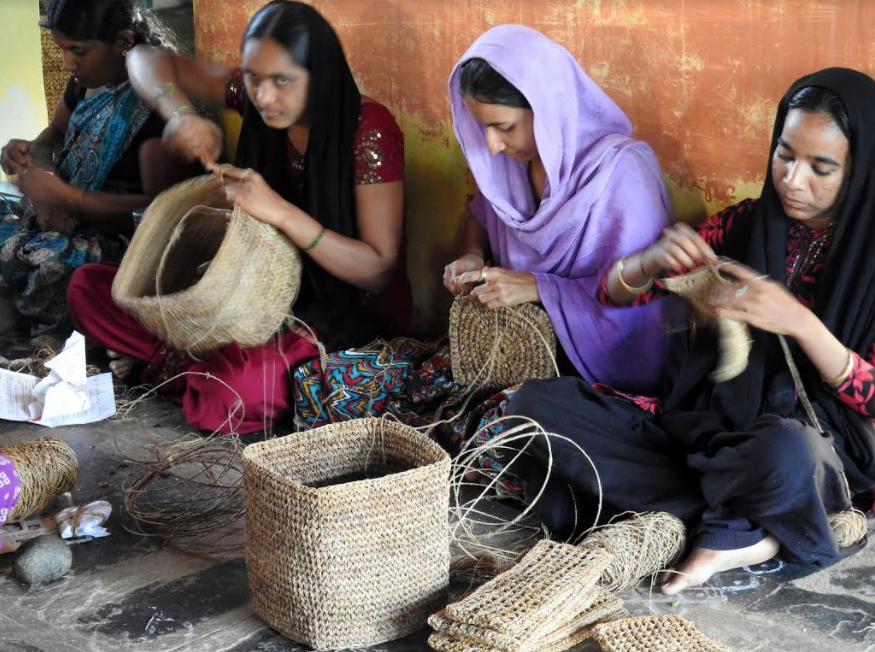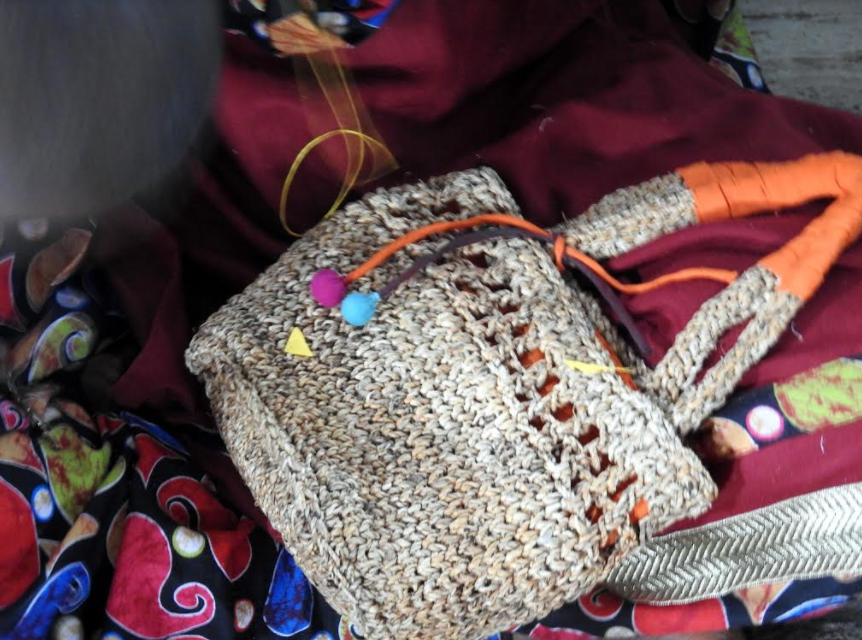Women’s empowerment is a word that is often used and more often abused in today’s times. However a recent visit to Anegundi village near Hampi, gave me a real perspective to the term and one I hope I will be able to see more of. Walking through the heritage village of Anegundi, I am fascinated with the way it is maintained and soon enough I am at The Kishkinda Trust (TKT) Banana Fiber Cottage Industry. What I see here is completely unexpected as scores of women were working diligently with banana fiber creating a range of products.
Started in 1998 by founder Shama Pawar, the banana fiber craft is an initiative to help develop local livelihood opportunities for women, based on the natural ecology of the region. The unit had only 8 women initially. Using locally available materials and skills the unit has grown to support the livelihoods of around 150 women, many of whom are the second generation of weavers/artisans to be working with the organization. “I visited Hampi in 1991 and fell in love with the place so I moved here in 1995. I have an urge to use things around me and banana was growing here in abundance so we decided to use it as the raw material. Now we have a new project using water hyacinth. We have just started a pilot project and we are currently focussing on small production and we need further R&D to move into making items like furniture,” says Shama. There are currently three units of banana fiber production, which include a rope making unit, a domestic market craft unit and an export unit which works with a market linkage partner from Finland. TKT aims to build capacity of the women at the grassroots level, to run the production units themselves, and has recently established the ‘Hari Dharti‘ Rural devilment society, to help transition the units to being owned and managed by the artisans,” says Shama. All proceeds from product sales, support these livelihood initiatives and help the women of the village to earn an independent income, while also creating a space, where they can work together, share their experiences and learn from one another as a family, and this reflects the core values of creativity, friendship and community that underpin all of TKT’s initiatives. With the aim of rural development and sustainability as well as conservation, the trust is certainly empowering women of this tiny village to dream big.
The banana leaf craft workshop incidentally not just employs local women but also helps recycle and conserve natural resources. The handicrafts created by the women are sold in the Kishkinda Trust’s Hoova Cafe and Craft Shop and the money earned is ploughed back into the trust. While the factory has several women who work at the premises, there are several others who do the same work at home. The raw material is available in plenty locally and is made by soaking the banana leaves to separate the two layers and once the leaf is soft the layers can be pulled apart. One layer is waste but the other is cut into thin strips and twisted to form strings from the fibres. These strings are hand-woven into bags, baskets, mats, hats, ornamental boxes, picture frames, handmade paper created from pulped banana fibres, and cotton and banana-fibre clothes and bedding. In fact today there is a whole section that is dedicated to making the raw material including coiling and making ropes. “In fact the rope making activity is completely independent and we buy the rope from them and they are also free to sell the rope to others as well.” Currently the setup is a sustained cottage industry and has been earlier funded by the Ministry of Textiles and there is no funding required for the existing activities. “Everything we do is pretty much self-sustained unless a new technology is to be used,” explains Shama. The products are available online as well orders come from abroad and also domestic tourists visit the store to make purchases.
Speaking to the women working at the centre, who are all quite shy, I get a sense that they feel empowered when they also make a contribution to the finances at home. Sakina (name changed) said, “It really feels nice to come and work here as we have most of our community members including our neighbours who work here. We are able to supplement our income and this helps running our home better.” In fact the women here have a flexible working environment and when you buy a product here you know that the funds go for a good cause and help benefits women of the village. Looking ahead Shama says, “we would like to see that the cottage industries across India to become more independent as the artisan community must be able to manage the marketing and communication as well. This is a skill that is currently lacking as level of education is still quite low as of now. We need to have artisans become better managers and the craft of India can be elevated to another level.” So on your next visit to Hampi, head to Aanegundi and visit the Banana Fiber Workshop – it is an exemplary organization that works at the grass root level and while it is a small venture it is one that has made a big impact!
This story appeared in the 8th August 2017 issue of Deccan Herald’s Spectrum here.


Good morning all. We are from Sabarmathi NGO, Tiruppur. We are giving skill training for differently able persons. So Pl give your valuable guidance for us in the below mail I’d. mail I’d is. littleguru14@gmail.com
Noted, I hope it helps someone who needs it.
anybody would have the contact number for Banana Leaf workshop? I need to place an order but the number on google is invalid
thanks
Please check mail
Need a contact for the workshop. Wanted to see the work and products.
Please check:
https://tktkishkinda.org/contact-us/